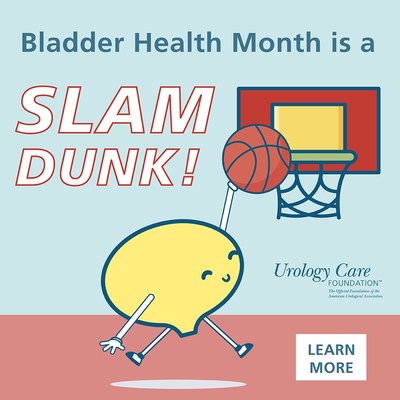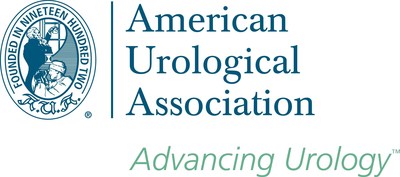Attention: Restrictions on use of AUA, AUAER, and UCF content in third party applications, including artificial intelligence technologies, such as large language models and generative AI.
You are prohibited from using or uploading content you accessed through this website into external applications, bots, software, or websites, including those using artificial intelligence technologies and infrastructure, including deep learning, machine learning and large language models and generative AI.
November is Bladder Health Awareness Month!
BALTIMORE, Nov. 2, 2020 /PRNewswire/ — The Urology Care Foundation, the official Foundation of the American Urological Association, is drawing on the month of November to help break the stigma surrounding bladder health issues and to offer the resources to raise awareness and help start the conversation between a patient and their healthcare provider.
Each year, millions of men and women struggle with the symptoms related to bladder health conditions or disease.
- More than 33 million Americans have overactive bladder – about 1 in 10.
- One in two women over the age of 65 are impacted by stress urinary incontinence.
- Bladder cancer is the sixth most common cancer in the United States.
- An estimated 1 to 4 million men and 3 to 8 million women have symptoms of Interstitial Cystitis/Bladder Pain Syndrome.
- Nocturia affects 1 in 3 adults over the age of 30.
"For many men and women, talking about incontinence or other bladder health conditions can be difficult or feel uncomfortable," said Harris M. Nagler, MD, President of the Urology Care Foundation. "It's important to realize bladder conditions are extremely common, and there is no need to feel embarrassed when talking to your healthcare professional - they are there to help you and provide guidance. In some cases, simple lifestyle changes can make a big difference in keeping your bladder healthy. Men and women should consult with their doctors to understand the options available to them to help improve their quality of life."
Utilizing the following weekly themes, the Foundation will work together to connect, educate and inspire women and men across the country to get the facts, get diagnosed and take control of their Bladder Health:
- Week 1: November 1 – 7 | Incontinence, OAB & SUI
- Week 2: November 8 – 14 | Interstitial Cystitis, Neurogenic Bladder & Bladder Infection/UTI
- Week 3: November 15 – 21| Bladder Cancer
- Week 4: November 22 – 28 | Bedwetting & Nocturia
- Week 5: November 29 – 30 | General Bladder Health
The Urology Care Foundation has developed a web page with resources for the public, in addition to its Twitter (hashtag #BladdersMatter), Facebook, Pinterest and Instagram platforms to disseminate this information for public use and dialogue.
Recognized by the U.S. Department of Health and Human Services as the sponsor of this National Health Observance, the Urology Care Foundation is the world's leading nonprofit urological health foundation and aims to support and improve the prevention, detection and treatment of urologic diseases through research and education.
Interview opportunities are available with Bladder Health experts. Contact the AUA Communications office by sending an email to communications@AUAnet.org.
About the Urology Care Foundation: The Urology Care Foundation is the world's leading nonprofit urological health foundation, and the official foundation of the American Urological Association. Partnering with physicians, researchers, healthcare professionals, patients, caregivers, families and the public, the Foundation supports and improves urologic clinical care by funding research, developing patient education and pursuing philanthropic support. To learn more about the Urology Care Foundation and its programs visit: www.urologyhealth.org.
About the American Urological Association: Founded in 1902 and headquartered near Baltimore, Maryland, the American Urological Association is a leading advocate for the specialty of urology and has nearly 24,000 members throughout the world. The AUA is a premier urologic association, providing invaluable support to the urologic community as it pursues its mission of fostering the highest standards of urologic care through education, research and the formulation of health policy. www.AUAnet.org
Contact: Taylor Titus, AUA
443-454-3743, ttitus@AUAnet.org
SOURCE American Urological Association and Urology Care Foundation



